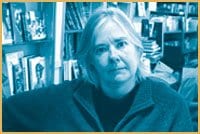Little Sister’s has been dealt a major blow in its fight against Canada Customs’ book seizures.
The BC Court of Appeal ruled Feb 18 that Customs does not have to pay advanced costs for the bookstore to continue its expensive legal fight against Canada’s border guards.
But the fight will go on, vows store manager Janine Fuller. “We’re committed to this case.”
If necessary, she says, the store will go as far as the Supreme Court of Canada to get the funding reversal thrown out. “We will persevere as we always have.”
Fuller says she’s not surprised by the reversal, but she is “deeply, deeply disappointed.”
The funding reversal stems from a June 2004 BC Supreme Court ruling which granted the bookstore advanced costs to pursue its latest complaint against Canada Customs-and ordered the federal government to pay up. The government appealed the ruling. Last month, the Court of Appeal sided with the government and overturned the order to pay.
The advanced costs centre around a complaint Little Sister’s filed against Canada Customs in 2001, after border guards seized copies of several SM comics and books bound for its shelves.
Little Sister’s alleges the seizures show Customs is still discriminating against its shipments-despite a Supreme Court of Canada ruling ordering them to stop unfairly targeting queer imports.
That’s just one of the arguments Little Sister’s is hoping to make to a judge-if its latest complaint ever gets its day in court. The trial is expected to last 12 weeks and cost more than $1 million.
Last June, BC Supreme Court Justice Elizabeth Bennett ruled the case was important enough to the public interest to warrant advanced costs.
“The issues raised are too important to forfeit this litigation because of lack of funds,” she found, noting that courts can grant advanced costs in “rare and exceptional circumstances.”
This is “a case of public importance and has not been decided by other cases,” she ruled. “That issue transcends the interests of Little Sister’s and touches all book importers, both commercial and private.”
The Court of Appeal rejected her finding. If the case only involves deciding if four books are obscene, then it is not an issue of major public importance, it ruled.
“The evidence does not indicate that the public in general, to say nothing of the gay and lesbian communities or the writers, publishers, distributors or retailers of erotic literature, view this case as of such importance that they will undertake financing,” Justice Allan Thackray wrote for the three-judge panel.
He said he found no evidence that the case was “special, even extreme.”
As part of their presentation to the panel, Little Sister’s lawyers argued the bookstore had “assumed the role of watchdog over Customs.”
Lawyer Joe Arvay said the store was the only entity which had the “will, the fortitude and the energy to challenge Customs’ discriminatory and censorial practices and does so on behalf of all Canadians.”
The appeals court was not swayed.
“The fact is that the public has not appointed Little Sister’s to this role. Little Sister’s not only wants to have Customs found to have incorrectly classified the books in question but wants to be financed as the instrument to reform Customs,” wrote Thackray with the support of Justices Wally Oppal and Mary Saunders.
Concluded Thackray: “I am not satisfied that it is necessary for Little Sister’s to be the instrument of reform of Customs.”
But, says Fuller, “if we’re not going to be the watchdog of Canada Customs-nobody’s ever taken on that role.”
It’s not the value of the books to the store that is important, she notes. It’s the value they represent to freedom of speech and expression.
Thackray missed the point, Fuller says.
In her earlier ruling, BC Supreme Court Justice Bennett estimated the trial would likely cost about $1.1 million. She also noted that Little Sister’s was still recovering from an internal fraud costing $80,000, and that the store’s attempts at fundraising “had not been particularly fruitful.”
Little Sister’s has been fighting Canada Customs ever since border guards began seizing its shipments in 1985. The store’s first legal complaint-challenging both the discriminatory nature of Customs’ seizures and its authority to seize any shipments at all-eventually went all the way to the Supreme Court of Canada.
While the high court didn’t accept the store’s argument that Customs’ right to seize books should be struck down entirely, it did order Customs to stop discriminating. (It also said importers such as Little Sister’s should no longer bear the burden of proving their materials are not obscene.)
When the store went to the Supreme Court the first time, John Dixon of the BC Civil Liberties Association, went with it.
Dixon says he is “very, very disappointed by the appeals court decision.”
He says the store needs appropriate funding to present a thorough case against Customs-which, he says, has an open-ended account through the federal government to finance its side of the case.
He calls Thackray’s comments “ill-informed.” This case is not just about Little Sister’s and four seized books, Dixon maintains.
“The reading rights, expression rights of an entire community are affected,” he says. “Almost everybody in Canada who reads books knows that Little Sister’s bookstore in Vancouver, British Columbia stands on the front lines.
“I can’t imagine how it could occur to the judge that Little Sister’s had not been singled out.”

 Why you can trust Xtra
Why you can trust Xtra


